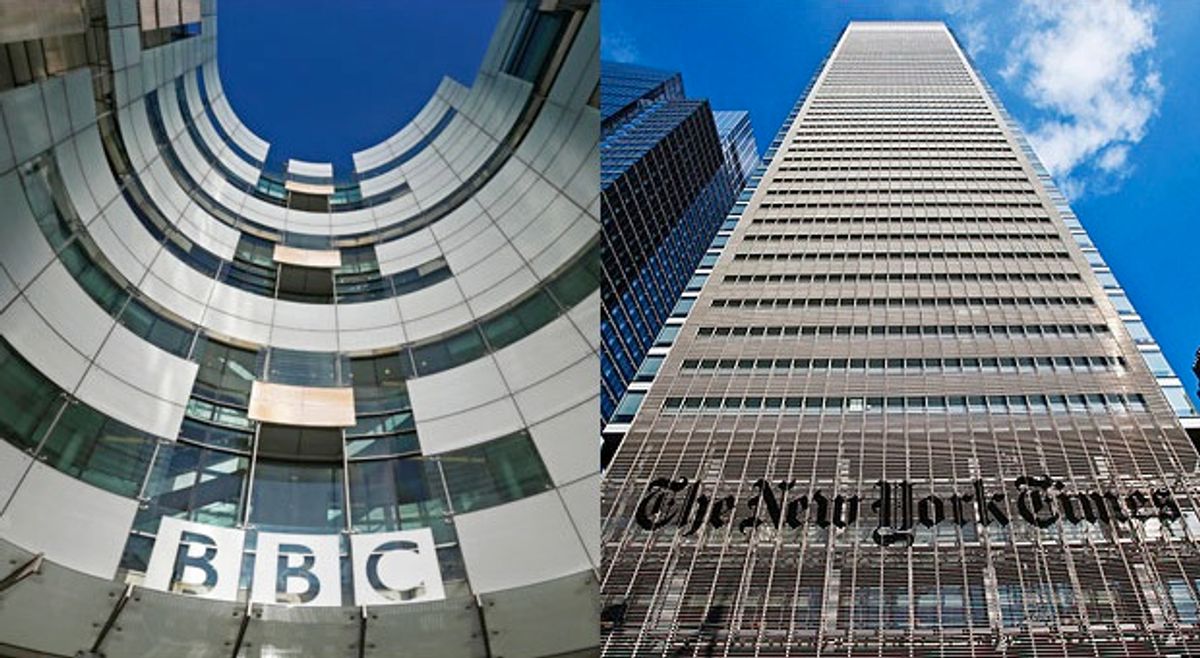A few weeks ago, I wrote about the BBC blowing £98.4 million (about US $150 million at current exchange rates) on its failed Digital Media Initiative project meant to develop digital production technology that would fundamentally transform how the BBC operated internally. The story gets more and more interesting, and has now leaped across the Atlantic to snare the head of the New York Times in its net.
To quickly recap, the DMI project began in February 2008 with the expectation that the project’s contractor Siemens Information Solutions and Services (SIS) group would have the “transformational” technology ready for operation by May 2009. Siemens, however, consistently missed the project’s schedule from the beginning, and in September 2009, the BBC and Siemens cancelled the contract by mutual agreement.
The BBC then brought the DMI project in-house with a new date for the rollout of DMI’s production technology across the BBC during the summer of 2011. When the National Audit Office, an independent Parliamentary body, took a look at the project’s status in late 2010, BBC management told it that “delivery of the system has progressed well, and users have responded positively” to it. BBC management also convinced BBC Trust's Anthony Fry, a member of the governing body of the BBC, that the “delivery [of the DMI system] was progressing as planned.”
However, progress didn’t go as planned. Users thought it was “clunky” and needed a significant redesign, and by October of last year, the DMI project was suspended pending a review. Last month, the new BBC Director General Tony Hall decided to pull the plug on the project, as it had created, in Trustee Fry’s assessment, “little or no assets.” Lord Hall immediately suspended (with pay) the BBC’s Chief Technology Officer John Linwood, who oversaw the DMI effort, and MP Margaret Hodge, chair of the House of Commons Public Accounts Committee called the cancellation, “a terrible shock and clearly completely shambolic.”
Here's where it gets really interesting.
Last week, the Guardian published a story that the head of the BBC Trust, Lord Patten, was informed in writing in May of last year by Bill Garrett, who was head of technology in BBC’s production division, that the DMI project was, in the Guardian’s words, “doomed to failure.” More importantly, the Guardian noted that, “Garrett wrote to Patten claiming that there was also a ‘very significant risk’ that the National Audit Office had been misled as to the progress of DMI when it investigated the issue in 2011 and took evidence from BBC executives.”
Ah, misleading the NAO is not really a smart career move: sort of like lying before the U.S. Congress. (The BBC is a public corporation that gets a mandatory annual license fee from every TV viewer in the UK, and is therefore subject to government oversight.)
The disclosure of Garrett's letter to Lord Patten led the Public Accounts Committee on Monday of this week to accuse the BBC and Mark Thompson, BBC Director General at the time and now CEO of the New York Times, of not being truthful when it told the NAO in 2011 everything was going well on the project. Specifically, Thompson told the NAO that the technology was “out in the business,” that there were “many programs being made with DMI,” and that DMI had contributed to on-air broadcasts, another Guardian story reported. Thompson also claimed that while there were a few minor issues, there would be no further delays with delivering the DMI project.
MP Hodge was quoted by the Guardian that she was told by the BBC, “…there were bits of this system that were working, you were using and running programs with them, and that wasn't true. That just wasn't true.” Hodge indicated that she was livid at being deceived. Trustee Fry felt the same way (he called the DMI project “the most embarrassing thing I have ever seen”) as did many MPs who had supported giving the BBC more time and money in 2011 to complete the project.
One member of the Public Accounts Committee took Fry himself to task, implying that the BBC’s governing body had been either lied to or had been negligent itself. The fact that the NAO was not informed immediately after the Trust received Garrett's letter warning about the BBC Director General possibly giving misleading testimony in front of it especially did not go down well. According to a BBC News story, the member told Fry, “What you're not doing is filling us with confidence that you've got mechanisms in place that you're going to avoid this sort of thing happening again.”
For a member of the BBC Trust, who is supposed to be the “guardian of license fee revenue and of the public interest in the BBC,” that was a highly stinging rebuke.
The BBC said in response to the growing firestorm that it “takes seriously its responsibility to provide the NAO and public accounts committee with the most accurate information at all times.” That remains to be seen.
On Tuesday, the Guardian reported that Thompson was being recalled to England to explain to Parliament his previously sworn testimony. Thompson was quoted as saying that he gave his testimony “honestly and in good faith,” and said, as he vigorously tossed everyone below him at the time under the bus, “I did so on the basis of information provided to me at the time by the BBC executives responsible for delivering the project.”
No doubt MP’s will be reminding Thompson of his assertion to them back in 2011 that BBC managers did not hold trouble back about DMI's true status to anyone, especially members of the BBC Trust, and that, “I cannot think of a single example of delaying or trying to put off the bad news.”
Thompson was hired in August 2012 by the New York Times, based in part because of his leadership in moving the BBC into the world of digital media. I wonder how the New York Times senior journalists, who weren’t thrilled about Thompson’s appointment for his lack of leadership or interest in uncovering the facts behind several major BBC scandals on his watch, think about having their boss yanked back to the UK to explain why so many in government think he lied to them? At the very least, Thompson's credibility has been wounded again.
Perhaps Thompson can borrow the explanation that Director of National Intelligence James Clapper provided when he was recently discovered to have disassembled under sworn Congressional testimony. In March, Sen. Ron Wyden (D-Ore.), who had given Clapper advance notice of the question he was going to pose, asked him, “Does the NSA [National Security Agency] collect any type of data at all on millions or hundreds of millions of Americans?” and he answered, “No sir … not wittingly. There are cases where they could, inadvertently perhaps, collect—but not wittingly.”
Well, as the world found out last week, the NSA does “wittingly” collect that information on hundreds of millions of Americans, as well as hundreds of millions of other folks as well.
Clapper explained in an NBC News interview that at the time, “I responded [to the question] in what I thought was the most truthful, or least untruthful manner by saying no.”
Clapper also argued in the interview that while he was being the “least untruthful,” he was simultaneously being entirely truthful. You see, it was all just a semantic misinterpretation of the word “collection.” To wit, “There are honest differences on the semantics of what—when someone says ‘collection’ to me, that has a specific meaning, which may have a different meaning to [Sen. Wyden].”
Maybe Thompson can just explain that he and the NAO had honest differences on the semantics of the DMI technology being "out in the business.”
Photos: Alastair Grant/AP Photo (BBC); Joseph Gareri/iStockphoto (NYTimes)
Robert N. Charette is a Contributing Editor to IEEE Spectrum and an acknowledged international authority on information technology and systems risk management. A self-described “risk ecologist,” he is interested in the intersections of business, political, technological, and societal risks. Charette is an award-winning author of multiple books and numerous articles on the subjects of risk management, project and program management, innovation, and entrepreneurship. A Life Senior Member of the IEEE, Charette was a recipient of the IEEE Computer Society’s Golden Core Award in 2008.



